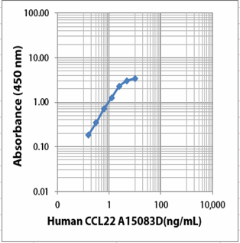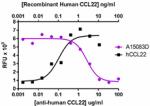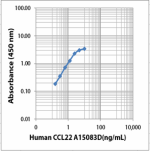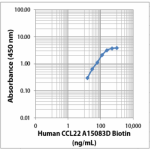- Clone
- A15083D (See other available formats)
- Regulatory Status
- RUO
- Other Names
- Macrophage derived cytokine (MDC), Small inducible cytokine subfamily A, member 22 (Scya22), stimulated T cell chemotactic protein (STCP-1)
- Isotype
- Mouse IgG2a, κ
- Ave. Rating
- Submit a Review
- Product Citations
- publications

-

Direct ELISA showing purified anti-human CCL22 (clone A15083D) bound to plate-immobilized recombinant human CCL22 (MDC) protein (Cat. Nos. 584902 and 584904). The wells were incubated with serially diluted primary antibody at room temperature for 2 hours in 1% BSA-PBS followed by incubation with HRP Goat anti-mouse IgG (Cat. No. 405306). TMB High Sensitivity Substrate Solution (Cat. No. 421501) was used as a detection system. Absorbance was measured at 450 nm.
| Cat # | Size | Price | Quantity Check Availability | Save | ||
|---|---|---|---|---|---|---|
| 694402 | 100 µg | 188€ | ||||
CCL22 is thymus-specific chemokine engaged in the recruitment of T cells. CCL22 is associated with different diseases such as allergen-induced lung inflammation, atopic dermatitis, and lymphoma. Also, high levels of CCL22 have been detected in the CNS in multiple sclerosis (MS) and experimental autoimmune encephalomyelitis (EAE). In addition, CCR4+ T cells have been linked to endotoxic shock, rheumatoid arthritis, T cell lymphoma, and autoimmune diabetes. CCL22 is a prostaglandin-dependent pyrogen, acting in the anterior hypothalamus to induce hyperthermia via activation of brown adipose tissue.
Product DetailsProduct Details
- Verified Reactivity
- Human
- Antibody Type
- Monoclonal
- Host Species
- Mouse
- Immunogen
- Human CCL22
- Formulation
- Phosphate-buffered solution, pH 7.2, containing 0.09% sodium azide
- Preparation
- The antibody was purified by affinity chromatography.
- Concentration
- 0.5 mg/mL
- Storage & Handling
- The antibody solution should be stored undiluted between 2°C and 8°C.
- Application
-
Direct ELISA - Quality tested
- Recommended Usage
-
Each lot of this antibody is quality control tested by Direct ELISA. The optimal concentration of this reagent for the specific application and the experiment design should be established by the end-user.
- Application Notes
-
- Clones A15083A and A15083D do not block each other
- Clone A15083A does not block the reference clone T51-719 (BD Bioscience)
- Clones A15083A and A15083D showed good staining in both Cyto-Fast™ Fix/Perm Buffer Set and True-Phos™ Perm Buffer.
- Additional Product Notes
-
This product is intended for sandwich-based immunoassay development on various assay platforms requiring antibody pairs. This antibody (clone A15083D) could function as a detection antibody when paired with purified anti-human CCL22 (MDC) antibody (Cat. No. 611952) (clone A15083A) as the capture antibody and using Recombinant Human CCL22 (MDC) protein (Cat. Nos. 584902 and 584904) as the assay standard. For assay development flexibility purpose this product is provided as purified format.
- RRID
-
AB_2941631 (BioLegend Cat. No. 694402)
Antigen Details
- Structure
- Chemokine
- Distribution
-
Macrophages, NK cells, IFN-γ stimulated human keratinocytes, thymic epithelial cells, and intestinal epithelial cells
- Function
- CCL22 induces the migration of CCR4+ Th2 cells, Tregs, DC, and NK cells. It is induced by LPS and CD40 antibody in macrophages. It is upregulated by Th2 cytokines (IL-4 and IL-5) and downregulated by Th1 cytokines (IFN-γ).
- Interaction
- Dendritic cells, NK cells, Th2 cells, T regs, CLA+ skin-homing memory/effector T cells
- Ligand/Receptor
- CCR4
- Biology Area
- Cell Biology, Signal Transduction
- Molecular Family
- Cytokines/Chemokines
- Antigen References
-
- Godiska R, et al. 1997. J Exp Med. 185:1595-604.
- Imai T, et al. 1998. J Biol Chem. 273:16551-4.
- Yamashita U and Kuroda E. 2002. Crit Rev Immunol. 22:105-14.
- Horikawa T, et al. 2002. Int Immunol. 14:767-73.
- Mailloux AW and Young MR. 2009. J Immunol. 182:2753-65.
- Dogan RN, et al. 2011. J Leukoc Biol. 89:93-104.
- Osborn O, et al. 2011. Cytokine. 53:311-9.
- Gene ID
- 6367 View all products for this Gene ID
- UniProt
- View information about CCL22 on UniProt.org
Other Formats
View All CCL22 Reagents Request Custom Conjugation| Description | Clone | Applications |
|---|---|---|
| Ultra-LEAF™ Purified anti-human CCL22 | A15083D | Neut,ICFC |
| Purified anti-human CCL22 | A15083D | Direct ELISA |
| Biotin anti-human CCL22 | A15083D | Direct ELISA |
| PE anti-human CCL22 | A15083D | ICFC |
Compare Data Across All Formats
This data display is provided for general comparisons between formats.
Your actual data may vary due to variations in samples, target cells, instruments and their settings, staining conditions, and other factors.
If you need assistance with selecting the best format contact our expert technical support team.
-
Ultra-LEAF™ Purified anti-human CCL22

Recombinant human CCL22 chemoattracts Baf3-hCCR4 transfectan... 
Enriched human peripheral blood monocytes were cultured (3 d... -
Purified anti-human CCL22

Direct ELISA showing purified anti-human CCL22 (clone A1508... -
Biotin anti-human CCL22

Direct ELISA showing biotin anti-human CCL22 (MDC) (clone A1... -
PE anti-human CCL22

Adherent peripheral blood mononuclear cells (PBMC) were cult...
 Login / Register
Login / Register 







Follow Us